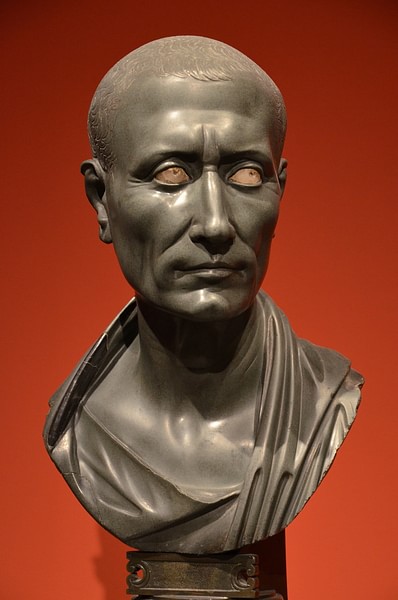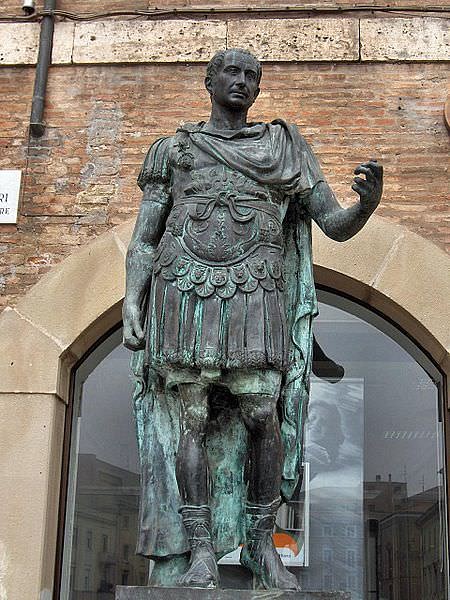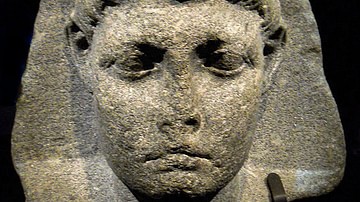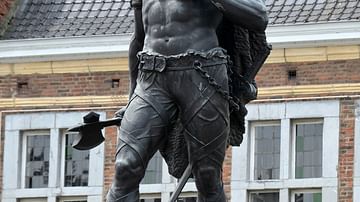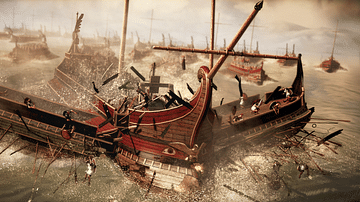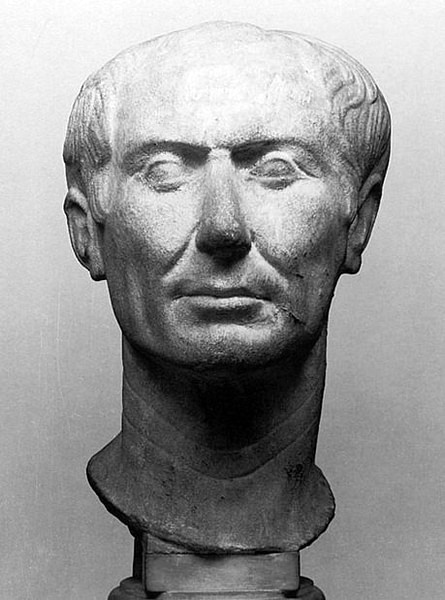
Gaius Julius Caesar was born 12 July 100 BCE (though some cite 102 as his birth year). His father, also Gaius Julius Caesar, was a Praetor who governed the province of Asia and his mother, Aurelia Cotta, was of noble birth. Both held to the Populare ideology of Rome which favored democratization of government and more rights for the lower class as opposed to the Optimate factions' claim of the superiority of the nobility and traditional Roman values which favored the upper classes. It should be understood that the Optimate and the Populare were not political parties in conflict with each other but, rather, political ideologies which many people shifted toward and from, regardless of class in society. The concept of appealing to the people for support, rather than seeking approval from the Roman Senate or the other Patricians, would work well for Caesar later in life.
Youth & Military Service
When he was sixteen, his father died and Caesar became the head of the family. Deciding that belonging to the priesthood would bring the most benefit to the family, he managed to have himself nominated as the new High Priest of Jupiter. As a priest not only had to be of patrician stock, but married to a patrician, Caesar broke off his engagement to a plebian girl and married the patrician, Cornelia, daughter of a high profile and influential member of the Populares, Lucius Cinna. When the Roman ruler Sulla declared himself dictator, he began a systematic purge of his enemies and particularly of those who held to the Populare ideology. Caesar was targeted and fled Rome but his sentence was lifted through the intercession of his mother's family. Still, he was stripped of his position as priest and his wife's dowry was confiscated. Left without means of supporting himself or his family, Caesar joined the army.
He proved himself an effective soldier, even being awarded the civic crown for saving a life in battle, and was promoted to the staff of the military legate to Bithynia to secure a fleet of ships. In this, as in his time as a soldier, Caesar was successful and, when Sulla died, he decided to return to Rome and try his luck as an orator (a modern-day lawyer). In this, too, he proved a success and became well known as an eloquent speaker.
It is said that when pirates told him he would be ransomed for twenty talents, Caesar claimed he was worth at least fifty.
In 75 BCE, while sailing to Greece, Caesar was kidnapped by pirates and held for ransom. In keeping with the high opinion he had of himself, it is said that when the pirates told him he would be ransomed for twenty talents, Caesar claimed he was worth at least fifty. While he was held captive by them, Caesar was treated well and consistently maintained a friendly relationship with the pirates. He is said to have repeatedly told them that, upon his release, he would hunt them down and have them crucified for the affront to his family and personal dignity and this threat the pirates understood as a joke. Upon his release, however, Caesar made good on that threat. He had the pirates' throats slit before crucifixion, however, in a show of leniency owing to their easy treatment of him in captivity. This determination of Caesar's, to do exactly what he said he would do, became one of his defining characteristics throughout his life.
The First Triumvirate
Back in Rome, Caesar was elected military tribune and, his wife Cornelia having died, married Pompeia, a wealthy Optimate granddaughter of the Emperor Sulla. Rising now in prominence in Rome, Caesar had enough prestige to effectively support Gnaeus Pompeius (later known as Pompey the Great) for a generalship. During this time he also became friends with the wealthiest man in Rome, Marcus Licinius Crassus. Crassus, it is thought, helped fund Caesar's bid for election to the position of Chief Priest (Pontifex Maximus) which he won in 63 BCE. In 62 he was elected praetor, divorced Pompeia after a scandal she was implicated in with another man, and sailed for Spain in 61 as Propraetor (governor) of Hispania.
In Spain, Caesar defeated the warring rival tribes, brought stability to the region, and won the personal allegiance of his troops through his skill on the battlefield. He was awarded a consulship by the senate. Returning to Rome with high honors, Caesar entered into a business/political agreement with Pompey and Crassus, in 60 BCE, dubbed The First Triumvirate by modern scholars and historians (though no one in ancient Rome used that term). Caesar married Calpurnia, the daughter of a wealthy and powerful Populare senator, and married his daughter Julia to Pompey to further cement their arrangements. The three men together then effectively ruled Rome, Caesar as consul, by pushing through measures favored by Pompey or Crassus in the senate. Caesar proposed legislation for reform of government, opposing Optimate sentiment, and a redistribution of land to the poor, both long-held Populare goals. His initiatives were supported by Crassus' wealth and Pompey's soldiers, thus solidly aligning The First Triumvirate with the Populare faction. As long as Caesar was a public servant he was safe from prosecution by his Optimate enemies for his legal indiscretions but, once his consulship ended, he was sure to be indicted. Further, Caesar was deeply in debt, both financially and politically, to Crassus, and needed to raise both money and his prestige.
Caesar's Conquest of Gaul
Recognizing the wealth to be gained through conquest, Caesar left Rome with his legions and went to Gaul in 58 BCE. He defeated the tribes there just as he had done in Spain and secured the borders of the provinces. When the Germanic tribes seemed threatening to invade, Caesar built a bridge over the Rhine River, marched his legions across in a show of force, then marched them back and had the bridge dismantled. The Germans understood the message and never invaded. He defeated the tribes of the north and twice invaded Britain (Rome's first incursion into the British isles). At the Battle of Alesia, in 52 BCE, Caesar defeated the Gallic leader Vercingetorix and completed the conquest of Gaul. He was now effectively the sovereign of the province of Gaul with all the attendant wealth at his disposal.
Back in Rome, however, The First Triumvirate had disintegrated. Crassus was killed in battle against the Parthians in 54 BCE and, that same year, Julia died in childbirth. Without Caesar's daughter and his financial and political backer tying him to Pompey, the latter aligned himself with the Optimate faction in Rome which he had long favored. Pompey was now the sole military and political power in Rome and had the senate declare Caesar's governorship of Gaul terminated and, further, ordered him to return to Rome as a private citizen. This would mean Caesar could be prosecuted for his actions when he was consul.
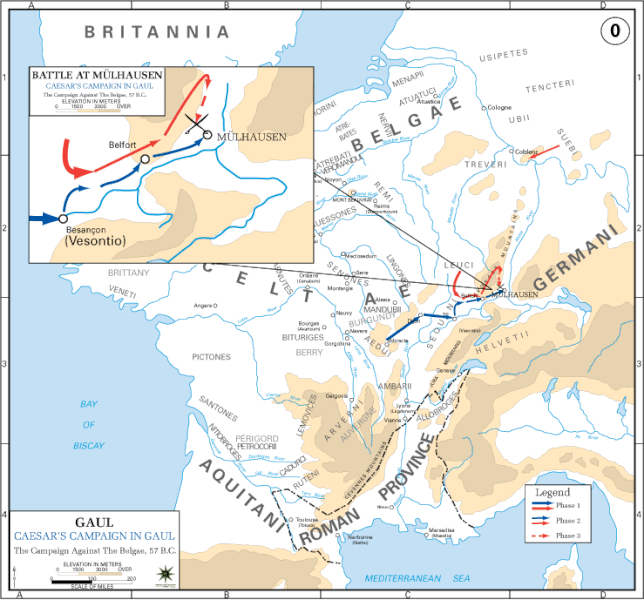
Crossing the Rubicon & Cleopatra
Rather than returning to Rome as ordered, Caesar crossed the Rubicon River with his legions and marched on the city in 49 BCE. This was considered an act of war as the Rubicon was the border between the province of Gaul and Rome. Pompey, rather than meet Caesar's legions in battle, fled to Spain and then to Greece where he was defeated by Caesar's much smaller force at the Battle of Pharsalus in 48 BCE. Pompey himself escaped from the battle and went to Egypt where he expected to find friends from his time spent there. News of Caesar's great victory reached Egypt before him, however, and the Egyptians, believing that the gods favored Caesar over Pompey, had Pompey killed as he stepped on shore.
Caesar, arriving in Egypt in pursuit of Pompey, claimed outrage over Pompey's death, proclaimed martial law, and took over the royal palace. According to the historian Durant, he then secretly sent for Cleopatra VII, co-regent with Ptolomey XIII who had been deposed and was in exile, who had herself smuggled through enemy lines rolled up inside a carpet (according to other sources, Cleopatra took the initiative herself, recognizing in Caesar her only hope to regain the throne). Caesar deposed the co-regent, Ptolemy XIII, and aligned himself with Cleopatra, igniting war between Caesar's legions and the Egyptian army. Besieged in the palace by the Egyptians under Achillas, Caesar and Cleopatra held out for six months until reinforcements arrived in March of 47 BCE and the Egyptian army was defeated.
Caesar and Cleopatra seemed to have become lovers shortly after meeting, perhaps even that very night, and he remained in Egypt with her nine months. The historian Suetonius writes, he “often feasted with Cleopatra till daybreak and would have gone through Egypt with her in her royal barge almost to Ethiopia had not his soldiers threatened mutiny.” In 47 BCE, Cleopatra gave birth to a son, Ptolemy Caesar (known as Caesarion) and proclaimed him her heir and successor to the throne.
At this time, Pharnaces, son of Mithridates, fomented rebellion in the east and Caesar rose to crush it. Leaving Cleopatra as ruler in Egypt, Caesar led his legions through Asia Minor, defeating the tribes and subjugating the people there, and then turned his attention to his enemies in Rome. At the battle of Thapsus (near modern Tunisia) Caesar's legions defeated the forces of the Optimate faction in 46 BCE and, in July of that year, he returned to Rome triumphant.
Egypt & the Roman Reforms
In Egypt, Cleopatra hoped Caesar would recognize and legitimize Caesarion as his son and heir. Caesar, however, named his grandnephew, Gaius Octavius Thurinus (Octavian) heir. He did, however, bring Cleopatra, their son, and her entourage, to Rome and set them up comfortably in a home which he visited frequently, despite the fact that he was already married to Calpurnia. Although the senate seemed incensed by this indiscretion (as the bigamy laws in Rome were strictly enforced) Caesar was granted the title Dictator Perpetuus (dictator for life) in 44 BCE. Contrary to popular belief, he never held the title `emperor'.
He initiated many reforms including further land redistribution among the poor, land reform for veterans which eliminated the need to displace other citizens, as well as political reforms which proved unpopular with the senate. He ruled without regard to the senate, usually simply telling them which laws he wanted passed and how quickly, in an effort to consolidate and increase his own personal power. He reformed the calendar, created a police force, ordered the re-building of Carthage, and abolished the tax system, among many other pieces of legislation (of which quite a few were long-time Populare goals). His time as dictator is generally regarded as a prosperous one for Rome but the senators, and especially those among the Optimate faction, feared he was becoming too powerful and could soon abolish the senate entirely to rule absolutely as a king.
Caesar's Death & Aftermath
On March 15, 44 BCE, Caesar was assassinated by the senators in the portico of the basilica of Pompey the Great. Among the assassins were Marcus Junius Brutus, Caesar's second choice as heir, and Gaius Cassius Longinus, along with many others (some ancient sources cite as many as sixty assassins). Caesar was stabbed twenty three times and died at the base of Pompey's statue. The assassins, however, made the mistake of neglecting to plan what they would do following Caesar's death and, in so doing, mistakenly allowed Marcus Antonius (Mark Antony), Caesar's cousin and right-hand man, to live. Mark Antony turned the tide of Roman popular opinion against the conspirators and, allied with Octavian, defeated the forces of Brutus and Cassius at the Battle of Philippi in 42 BCE.
Mark Antony later allied himself with Cleopatra VII of Egypt following the victory and, Octavian thought, presented a substantial threat to Rome. In time, the former allies went to war and met in final battle. Cleopatra's and Antony's forces were defeated by Octavian at the Battle of Actium in 31 BCE and they killed themselves a year later. Following their deaths, Octavian ordered Cleopatra's son, Caesarion, murdered. After Octavian consolidated his power as the first emperor of Rome, he had Caesar deified and, as his adopted heir, proclaimed himself a son of god and took the name Augustus Caesar, Emperor. In doing so, he initiated the end of the Roman Republic and the beginning of the Roman Empire.
